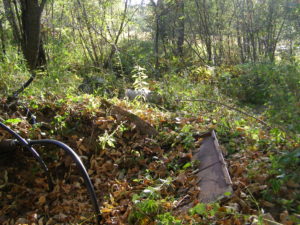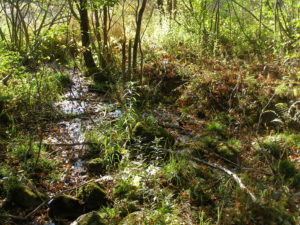by Jenny Rose | Jan 18, 2018 | Connection & Community, Emotional Intelligence
For several weeks the depth of snow has limited my ability to walk on our 26 acres. Last week we had a couple of inches of rain that arrived with the scent of the sea and tropical warmth, followed by a hard, fast freeze. The rain melted a great deal of snow and we had flooding. The sudden freeze created a hard crust on the remaining few inches of snow, and as we returned to subzero winter temperatures I decided to see if I could get down to the river.

Photo by Vincent Foret on Unsplash
The crust supported my weight — sometimes! Other times I broke through and floundered up to my knees, the icy rind bruising and scraping my lower legs in spite of long underwear and heavy canvas pants. I saw tracks of deer and moose, rodents and birds in the snow. The river, ice encased, had thawed slightly and flooded during the rain, so the cracked ice was piled in slabs. In some fissures I could see open water. In other places thin new ice had formed and old, yellow ice lay flat but spiderwebbed with cracks.
As I stood next to the river catching my breath and marveling at the power of winter, I could hear the voice of the ice. It’s an odd sound, because it comes from beneath one’s feet rather than the sky or the world around. The ice pops and groans, sings and mutters and snaps. It’s a wild, unearthly voice, a chorus of cold water, cold air and cold crystals, the medley of flowing, living water and rigid winter armor. I wondered what it sounded like to the creatures hibernating in the river bed and the beavers in their dens.
The trees here have voices as well. When the wind blows they creak and groan as they sway, and their branches rub together, making a classic haunted house rusty hinges sound. In the deep winter when it’s very cold, sap freezes, expanding, and the trees explode with a sound like a gun going off. Sometimes they split right through the trunk.
So many voices in this world. Every place has its own special choir, every season its own song. The sound of a beetle chewing bark, the Barred owls calling to each other in the snow-bound January night, the agonized shriek of a vixen calling for a mate on a February midnight of crystal and moon, and the barely discernible high-pitched talk of the bats as they leave their roost at dusk are all familiar voices to me.
I’m a seeker of voice, a listener, partly because I’m a writer and partly because I know what it is to be silenced. Our world contains so much pain and suffering, such unimaginable horror and injustice that my compassion is frequently overwhelmed. I cannot staunch the wounds and wipe the tears of the world.
But I can listen. I can bear witness. I can stand and wonder and marvel at the wild ice, the mating owls, the hunting bats and also the handful of people in my life. For a few minutes, I can encircle another with my presence and attention, allowing their voice to speak freely, truly and fully. I can choose to have no agenda about the voices of others, no expectations or judgements.
I can also give that to myself. It’s only in the last three or four years that I’ve reclaimed my own voice. That, more than anything, is why I began writing this blog. Once a week I sit in front of a blank page and write in my true voice. Blogging, for me, is not about validation or statistics. It’s not about trying to please anyone, creating click bait or competing. It’s about contributing my voice because I am also here, not more important but as important as anyone else.
Using our voice does not require a listener.
Listening to the ice and the world around me has allowed me to realize, for the first time, how deeply I’m committed to appreciating and supporting authentic voice. My appreciation is a thing apart from agreement or disagreement with what I hear. Speaking our truth is not a matter for criticism. It’s an offering of self, and listening without judgement is an acceptance of that offering. I feel no need to annihilate those I disagree with.

Photo by Quino Al on Unsplash
The dark side of voice is the voice that deliberately drowns everyone else out, the voice that silences, controls and distorts our world and our sense of self. The voice that deliberately destroys is an evil thing, a thing afraid and threatened by the power of others. Dark voices throw words like a handful of gravel in our faces.
An essential part of self-care is learning to recognize, minimize and/or eliminate our exposure to voices we experience as destructive or silencing. This is boundary work. Note the difference between appropriate boundaries and dropping an atomic warhead. Healthy boundaries do not disrespect, invalidate or silence others.
I wonder what the world would be like if all criticism, jeering and contempt were replaced with “I hear you. I’m listening. I believe in the truth of your experience. You are not alone.” What would we be like if we gave that gift to ourselves?

Photo by Quino Al on Unsplash
And what of lost voices? I don’t mean unheard or unremarked, but those voices who spoke, faintly, for a moment, and then were silenced so brutally and completely no one but the silencer heard their last cry. Such a person lives, breathes, walks, eats and sleeps, but he or she is a shell mouthing superficial words. Attempts to draw close, to understand, to share authentically and elicit a true voice in return are all in vain. The phone is off the hook. Silence and deflection are the only response. No one is at home. Love and listening count for nothing and behind the mask is only emptiness. Connection is denied.
How many voices can we truly hear? The world is filled with a cacophony of sound made by billions of people. Even here in the heart of Maine the voice of the river is punctuated by traffic noise. We all seem intent on increasing our exposure to voices via social media, 100 TV channels, streaming, downloading and YouTube. Does all this clamor make us better at listening and honoring voices? Can we listen to our child, our mate, the TV, and read Facebook all at the same time?
Some people say they can, and perhaps it’s true. What I know is I can’t. I don’t want to. I don’t feel listened to when I’m competing with other voices. I can’t hear myself when my day is filled with racket and din. I can’t extend the gift of presence to 100 friends on Facebook. I can’t discern between an authentic voice and a dark voice in the middle of uproar.
Voice is precious. It’s sacred. No created character lives in our imagination without voice. Silencing voice is a horrific violation. I have promised myself I’ll never again abdicate my own voice.
Honoring voice, yours, mine, theirs, and the world’s.
All content on this site ©2018
Jennifer Rose
except where otherwise noted
by Jenny Rose | Oct 5, 2017 | Emotional Intelligence, Feelings, Love
A few weeks ago I wrote about romance and in that post I confessed that at this point in my life I’m not sure what love actually is. A strange admission from a reasonably intelligent, well-educated, middle-aged broad with two marriages and two children in her history.
Writing that post enabled me to clearly separate romance from love; though I suppose love might include a little romance from time to time. I’m convinced romance is not synonymous with love, however. I began to make a mental list of what love is not, as I often approach things from the back door first. Love is not a synonym for:
- Romance
- Sex
- Slavery
- Control
- Possession
- Obsession
- A suicide pact
- Abuse
- Fear
- Duty
- Obligation
- Enabling
- Obedience
All right. So what is love? My Randall House Collegiate Dictionary says it’s “a profoundly tender, passionate affection for a person” or “a feeling of warm personal attachment or deep affection.” This definition doesn’t satisfy me at all. My rewrite is that love is a feeling of warm, tender connection and deep affection. I don’t think love is always passionate and I don’t like the word attachment. If anything, love implies to me an attitude of nonattachment.
But what about unrequited love? What about failed love or withdrawn love or love as a weapon or a tool? What about the inability to accept love, or feeling unloved though being told we are? What about those who make us feel our love is ugly, twisted, shameful or inadequate?
I’m always playing with words in my head. This week it’s “What is love?” and “What is a crone? and “What are the differences between compassion, empathy and sympathy?” I lie down with those inquiries and wake up with them. I turn them over while I shower, cook bacon, wash dishes, take my morning walk, practice Tai Chi and drive to town. I’m constantly scribbling notes.
I gave a neighbor a lift this morning and asked him to talk to me about compassion, sympathy and empathy. Poor man. He didn’t know what to make of me.
Yesterday, during my frosty morning walk, I dove into a stand of staghorn sumac below the barn and went to visit the spring. This is a daylight spring seeping out of the hill on which the barn and house stand. A long time ago, someone dug a well there, and at one time a pump and tank were installed, along with a system of black plastic outdoor lines to carry water to and from the barn, the garden, and down through the woods to, presumably, crops in the fields below. All the equipment is many decades old now, fallen over and covered with leaves and moss. The well is protected by a round cement cap, much too heavy for me to lift alone (drat!).

Spring
This spot is hidden in a thick tangle of vine, briar and trees. We rarely go in there, though it’s in close proximity to the barn.
It’s fall and it’s been dry, but the drainage where the spring emerges is clearly marked by rocks and moss. The ground underfoot felt soft, and when I brushed away the leaves I found moist earth. A yard or two below that is mud, and then a trickle of water and then, at the bottom of the hill, a quiet film of water, barely moving, reflecting the tree-laced sky. Right now It’s full of apples dropped from an apple tree that grows alongside it.
As I slipped and slid, tripping over vines and getting scratched by hawthorn and raspberry bushes, feeling the velvety moss coating the rocks and stepping cautiously on rotting wood, it occurred to me that love is like this spring.
I’ve always thought of love as an action verb, something I do to another in exchange for receiving the same. I thought I knew what I meant when I used the word, though I was never challenged to define it exactly. For me it’s been a catch-all term, synonymous with dozens of other, more specific actions: Want, need, desire, honor, trust, respect, care about, listen to, defend, make excuses for, enable, protect, support, believe in, etc., etc.
But what if love is just being? What if it has no object, but just is?

Spring
This little spring is absolutely true to itself. Water drains off the hillside above us and carves a path through the earth and rock until it emerges and runs down the surface at the foot of the hill. We pay no attention to it whatsoever. It’s reliable, predictable and faithful, but not because anyone is looking. Its unobtrusive, quiet presence has created a lush pocket of life, a complex system of plants, fungi, animals and insects, but ten yards away on the open hillside it’s invisible.
What if I make a choice to allow my feeling of love to run through my life in the same way the spring runs through and over the ground? What if I carry within me a wellspring, a hidden cleft, moist, fertile, filled with life, rich in sensuality, simply because it’s an expression of self? If others find their way to it, sit a while, bathe, drink, and allow it to nourish and refresh them, they’re welcome. If others can’t see it, or don’t value it, or dislike the perfume of rotting wood and leaves or the feel of plush moss under their bare foot, it’s nothing to do with me. Not everyone chooses to make their way through raspberry and hawthorn bushes, after all.
What if I don’t need anything in return because I’m giving nothing away? Perhaps the act of love can be a simple state of being, not a totality, not a hurricane of passion and lust, not a romantic fairytale, not a prison and torture chamber, but a spring, a waterway, a shining thread I can share without depletion. Can I allow it to seep quietly up through the roots of my experience, even if no one else ever finds it, wants it, returns it or deems it acceptable?
Our spring is part of a landscape of field and forest, river, pond and stream, rocky hillside and bog. The landscape contains many forms and embraces many systems of life. Birth and death happen on this land. Disease, erosion and flood happen on this land. Prey and predators carry out their sacred dance of balance here. Blood, bone, fur, feather, antler, musk, urine and feces are all here.
I, too, am a complex system of history, memory, belief, thought and feeling. I do not feel love for everyone and everything. My experience of love is that it’s a wild thing; it seeps up where it will and trickles away without warning, taking no account of rules and expectations. I can’t command it and I don’t choose to hold it back. My love doesn’t need anyone’s reception, appreciation, validation or praise.
Love is. I reserve the right to love as I will. I am the keeper of my own wellspring.

Spring 10/2017
All content on this site ©2017
Jennifer Rose
except where otherwise noted
by Jenny Rose | Feb 9, 2017 | A Flourishing Woman, Self-Love
I recently read a brilliant essay on tolerance that clarified for me why I haven’t always experienced successful outcomes while practicing it! Here’s a quote to think about from that article:
“[Tolerance] is an agreement to live in peace, not an agreement to be peaceful no matter the conduct of others. A peace treaty is not a suicide pact.” –Yonatan Zunger, ‘Tolerance is not a Moral Precept’

Photo by 小胖 车 on Unsplash
I’ve found that one of the many unpleasant effects of pleasing people, trying hard, being compliant and demonstrating unfailing compassion and kindness is that it’s stunted my emotional growth. It’s made me weak, naïve and dependent. It’s taught me to be powerless.
At this point in my life I’m making different choices, and as I do that I’m losing my fuzzy-headed, goody-two-shoes, sweet maiden aspect and becoming much clearer about who I am and what I believe in.
I’m not the only one, either. My second-hand exposure to social media through my partner, as well as my own reading of blogs, articles and essays, demonstrates loud and clear that many of us are in the process of refocusing our beliefs and values. Just yesterday I read an article about the devastating impact of the presidential election on close relationships and social media communities, as well as the way it’s opened up new connections.
As I listen, watch, read, write and think about it all, I return, again and again, to the conclusion that we’re all dealing with the same underlying ideas and issues. I know there’s a lot of heated and poisonous ideology out there about race and ethnicity, sexuality and gender politics, religion, and even what we eat, but underneath all that distracting noise are the same issues of tolerance and intolerance, power and identity, and fear.
I’ve written previously about reciprocity. When I read Zunger’s post, I immediately understood why my practice of tolerance has had, in some cases, quite devastating results. Once again, I was extending something I wasn’t receiving in return. Having been well trained (and slightly dim) it didn’t occur to me before that it’s not my responsibility to meet intolerance and disregard for my own boundaries with continuing tolerance. I’ve clung to the dangerous belief that if I just model and demonstrate well, the other party or parties will get it, and want to live in a more peaceful and effective way (my way, of course!)
After all, I don’t want to stoop to their level!
Ick.

Photo by John Salvino on Unsplash
This is a pretty effective set of shackles. Like many women, I’ve accepted them meekly for most of my life.
I’m bored with that now. It’s never worked well. It’s always left me terribly and painfully vulnerable. Turn the other cheek sounds like a lovely ideal, but in practice it sucks. In my study of combatives, I’ve found another option: Go in peace, but if a predator attacks you, be so explosively aggressive you become the predator and they become the prey. Take them out of commission as fast and effectively as possible and get away from them. Permanently.
I know, I know. Unattractive. Not nice. Being part of the problem rather than the solution. Violence solves nothing.

Photo by Jason Blackeye on Unsplash
That’s all fine, if it works for you.
It hasn’t worked for me. I’m not sure why it’s unattractive and wrong to defend myself (or others), except, of course, from the predator’s point of view.
I don’t care what the predator thinks. Predators have to take their lumps, just like the rest of us.
It seems these days going in peace means having no opinions, asking no questions, voicing no disagreement, stating no beliefs and citing no personal experience. There’s sure to be someone who will step in and try to shut us down with violence, abuse and threats if we speak up.
I love the idea of tolerance as a peace treaty. It gives me everything I need. It accommodates my intention to seek and support connection. It allows me to continue to be completely disinterested in someone’s religion, sexual preference, gender experience, physical anatomy, race, ethnicity, diet or reproductive choices as a criterion for judgement. Tolerance as a peace treaty leaves ample room for the things I do care about — authenticity, compassion, power-with rather than power-over, the desire to connect. It’s a peace treaty I can honor whole-heartedly.
Right up until someone tells me to shut up and sit down, make myself small, stop asking questions. Right up until someone tells me what to believe, what spiritual framework to use, what to think, what agenda to accept, what to do with my body and what my boundaries should be. Right up until I feel uncomfortable, in fact. Then the peace treaty is broken, and I give myself permission to exit, quietly if allowed and like a fighting tigress if hindered.
Tolerance is not an expression of weakness. It’s not permission to use and abuse. It’s not an agreement to abdicate self-defense. It’s not a suicide pact.
Nobody is entitled to tolerance.
Tolerance is a gift that must be both given and received. Let’s be worthy of it.

Photo by Evan Kirby on Unsplash
All content on this site ©2017
Jennifer Rose
except where otherwise noted
by Jenny Rose | Sep 29, 2016 | Power
I’ve been thinking about this week’s post for a couple of days now. There’s a lot more to say about boundaries than I’ve discussed here and here, and maybe someone else can shape the many complex pieces into separate, coherent posts, but that person isn’t me. I can sort out a few points, but the rest is chaos containing all kinds of inflammable issues, such as parenting, corporal punishment, our justice system, religion, sexuality, morals, ethics, rape culture, racism, entitlement and patriarchy.
There’s no doubt in my mind that these are important discussions and ideas for all of us, but the purpose of this blog is not to have a shouting match or explore the different ways we can criticize, judge and belittle one another.

Photo by Andrew Loke on Unsplash
I suspect most of us agree boundaries are necessary, but after that point I see potential for endless violent disagreement about how and why we create and manage them. I believe it’s safe to say our understanding of boundaries is heavily influenced by our childhood experience, our culture and family, and technology and media.
I have no answers. I notice what I call my boundaries don’t work very well at times. I notice the conflict between what works for me, what others expect, and what I’ve been taught. I notice a generation gap around boundaries. My 20-something sons see the whole issue differently than I do. I think some of this is due to differences in our relationships to technology, but I don’t know how much.
I also notice a lot of my boundaries are around fear. As a single woman, I’m uncomfortable with the idea of being hooked into GPS and map information via technology. It doesn’t feel safe to me. Likewise, I’m uncomfortable discussing my spirituality, my parenting beliefs, my political beliefs, my dietary choices and the color of my underwear. I’m not ashamed of who I am — I’m afraid of being victimized. I don’t want to deal with mean, hateful or dangerous people. I don’t want to attract the attention of a psychopath or a sociopath. I don’t want to lose connections and relationships over something like religion.

Photo by Mike Wilson on Unsplash
Then there’s the part of me that simply isn’t interested in what I call oversharing. I mind my own business — why can’t everyone else mind theirs?
On the other hand, surely we have a right to be who we really are. But where is the line — the boundary, if you will— between that right and violating someone else’s boundary?
A highly topical example of this is the debate over Native American team names in the public school system. Many Native Americans find this offensive and racist — and say so. The other side hotly denies they’re racist and cites tradition and their intention to honor the Native American people. It’s a ding-dong argument. I’m hurt and offended and this feels racist versus I am not a racist, back and forth, on and on, with both sides becoming further divided with every iteration. Broken connection, broken relationships, divided communities, hurt and rage are the result.
At bottom, it seems to me these are all boundary issues. Our boundaries don’t appear to work well. What can we do about that?
This very morning, I had an interesting discussion with one of my sons about this. We were talking about privacy in regard to technology, and he suggested that soon we may have to accept the idea of 0% privacy because of our increasing reliance on and use of technology. Everyone (at least in this country) will be equally exposed and we’ll have to figure out how to live with that exposure as a culture and move on, or we’ll simply self-destruct. I’d never considered this point of view and I’m fascinated with it, as well as slightly appalled.
Perhaps the chaos around boundaries is present because, as my son suggests, we’re in transformation. Transformation is inherently chaotic, after all. Maybe my generation’s ideas and beliefs about boundaries aren’t working because they’re outdated. Our world, our culture, our understanding of life, technology and science are dynamic, always changing, always correcting and expanding. Perhaps the world we live in today requires different boundaries and we’re struggling to shape them.
At the risk of sounding like an old granny, however, I think healthy, effective boundaries must contain elements of respect, compassion, authenticity, dignity and kindness, not only for others but for ourselves. I think it’s important to remember that boundaries are about ourselves and what works and doesn’t work for us. It’s not our job to choose boundaries for others. We may have to defend our boundaries and others will certainly try to violate them, but that’s the only place our power is.
Interestingly, I’m reading a book right now that relates to this. It’s called Being Wrong by Kathryn Schulz. It’s a great book — well written, funny, intelligent and thought-provoking. I highly recommend it. The reason I mention it is that so many of our rules, expectations and yes, boundaries, are based on our beliefs and we have a tendency to make our beliefs universal laws. We all do this, one way or another. But take one of your central beliefs, a hot one like politics or diet or religion, one you argue about on Facebook, block and unfriend people for disagreeing with. Now just imagine, if you can, for one minute, only 60 seconds, that you’re wrong.
Pretty uncomfortable, right? Now everything changes, including your rules, expectations, stories and, inevitably, your boundaries.

Photo by Alessio Lin on Unsplash
In other words, effective boundaries need to flex and change as we learn and grow. Otherwise, all we create is a jail cell for ourselves. We can’t change, we don’t admit new information and we keep ourselves small and rigid.
On the other hand, if we have inadequate boundaries our power is leaking all the time. We fall prey to dysfunctional relationships, our integrity breaks, we fail to take care of ourselves, and our lives don’t work well.
All content on this site ©2016
Jennifer Rose
except where otherwise noted
by Jenny Rose | Sep 8, 2016 | Power

Photo by Bewakoof.com Official on Unsplash
I recently had a discussion with a young friend who’s going through a hard time.
I listened and asked questions, and did my best to enter into her experience. My agenda wasn’t to rescue, fix, or advise, just to let her know I cared and help her think about options.
My intentions were good, but I walked away feeling as though I’d only irritated her and made things worse. Ever since, I’ve been questioning what I said and how I handled this interaction. Was I patronizing? Condescending? Obnoxiously optimistic? Aggressively parental? Didn’t I listen well?
Or maybe my questions were the problem, not because they were bad questions but because they were good questions. I’m reminded of people in my life who have approached my distress with the kinds of questions that made me want to hang up the phone or slap their face. Their questions challenged me to break out of the shrinking cage I was in. They challenged me to take control, take responsibility, face my fear or think outside my usual box.
I’m not sure why, but when I’m good and miserable, or at panic stations, or swept up in powerlessness, I want someone to agree with me. It’s hopeless. I’m helpless. It will never get better. I made mistakes, bad choices, stupid decisions and now I’m paying a price I deserve to pay. I’ve dug a hole so deep I can’t get out without some kind of divine intervention. I have to wait for someone to rescue me.
Sitting here writing this it sounds silly, but it’s not silly when I’m in it. We’ve all had times like this. What I know is that my best friends in crisis are the ones who metaphorically kick me in the butt. They won’t walk down the pity path with me. They won’t agree that it’s all over because I screwed up or made bad choices. They don’t admit the past was apocalyptic and the future will be catastrophic.
These people keep redirecting me back to what I can do right now to help myself, and away from everything else, and sometimes they’re not gentle about it.
This is tricky because it’s counterintuitive, at least to me. When I’m faced with a problem, I want to square right up to it, obsess, throw myself at it, beat my head against it and leave the rest of my life unoccupied. It’s either an all-out wrestling match or I eat ice cream out of the carton (a big carton!), stop taking showers, binge watch ‘Buffy the Vampire Slayer’ all night and sleep all day.
Neither of these approaches has worked for me. The only thing that has ever worked is to identify where my power is right now and let the rest go. I don’t know why that works. I don’t know how it works, but I know it does.
When I was a low-income single mom, what this meant was realizing summer was ending and the boys would need new winter coats I couldn’t afford, and we would need groceries a lot sooner than that, but I had no money. And yes, I was working. At one point I worked two jobs and attended school.

Photo by Mitchell Orr on Unsplash
Anyway, I developed a habit of shaping the day around what I could do instead of what I couldn’t do. I tried not to think about the next day, the next week, the next winter. I figured out what we’d eat that day from what we had, and I did what I could do — all the things that can be done without money. Like playing with Legos on the living room floor, or taking a walk, or reading aloud to the boys, or doing laundry, or working in the garden, or scrubbing the kitchen floor.
Some days were so hard I just lived five minutes at a time. It was all I could handle.
My kids are in their twenties now. All those five minutes, all those one-day-at-a-times passed and we weren’t homeless, we weren’t without food and we always managed winter coats, thanks to Goodwill. I have no idea how it all worked. I didn’t know then and I don’t know now.
Now, it’s true I found jobs, got trained and educated, did without things like cell phones and cable TV. I did what I could to help myself through those years, and I had a lot of outside help, too. But my point is I tried not to get stalled with my nose touching a brick wall. I tried to look in another direction — in a direction where I could make choices. Doing that didn’t make the brick wall disappear, but somehow it allowed me to move past it.
Getting back to my friend, I tried to ask questions about where she did have power, but she felt powerless in every direction and the questions only reinforced the feeling instead of helping her reconsider her situation. I left the conversation feeling upset and frustrated and decided I needed to take a step back, give my friend space and let it all unfold.
Interestingly, in the time between that conversation and this minute, my friend got what she needed from someone else, made some hard choices and now sees her way ahead, at least for a few steps.
What I’ve learned from this is that no matter how much I love and care for someone, no matter how much I want to share what I’ve learned in life, sometimes I just can’t be useful or effective. That doesn’t mean, however, that my loved one won’t get what they need from someone else. I’m trying hard to persuade myself this doesn’t make me a failure, but it’s uphill work. Additionally, I have a sneaking suspicion that part of what I feel is nothing more than injured pride. As long as I’m confessing, there might be jealousy in there, too.
I’ve also relearned the thing I wanted to teach. It was clear to me I couldn’t be an effective support to my friend, I couldn’t make her feel better, I had nothing to offer she could use. However, two cords of wood were sitting in our driveway, so my partner turned on music and we stacked it in the barn. He and I cleaned out a closet and I got my fall/winter clothes handy. I was scheduled to work on Labor Day weekend and the day after, so I showed up for work and did my best. I wrote a few pages of my current book and I wrote this post. Today I swim. It was in the middle of all this that my friend came to me with the beginnings of her own solutions to her own problems.
Maybe my love and concern were only an added pressure for my friend. Maybe the most helpful thing I did was step back and live my own life. That, after all, is where my power is.
I just wish it didn’t feel so inadequate.

Photo by Jan Phoenix on Unsplash
All content on this site ©2016
Jennifer Rose
except where otherwise noted















